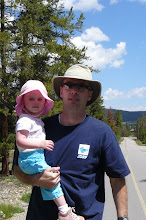polaroid ghosts
Tuesday, March 29, 2005 by niebuhrian
At any given moment, numerous highways of thought skitter across the landscape of my mind. These are the images of my life, the contents of my brain, the associations and the experiences that form and shape who I am. The ones that intrigue me most are the ones from my childhood. They are like gold, like finding a twenty in your jeans pocket, like getting to eat the last M&M, or scoring under 90 for the first time ever on a golf course. These images are the ones that capture my attention because they are few and incomplete. When they come into being I am reminded of a Polaroid picture that is not fully developed, complete with gray ghost-like images of scenes long gone and faces too young to be real.
Today, it was soccer. The ghosts came back from my eighth year on this earth, and I was clad in a shiny blue polyester uniform with white stripes down the side. I was playing defense, though I am not sure why, I remember people would back up when I kicked the ball. Soccer’s rules confused me and I can recall being embarrassed when I broke one of them. It was also a short ride to the field, situated between our house and
When these gray memories bound into my mind, I instantly begin to struggle. I want to complete the picture so I let my mind flail around so that the Polaroid will develop quickly and the picture will be completed. I want to know what happened, to remember the early experiences that shaped who I am today. Sometimes, this struggle bears fruit and different pictures appear; these are random free associations and there is danger in allowing my mind to wander freely.
Generally, the thoughts begin growing in a benign fashion. In the midst of these soccer memories, two other thoughts tagged along. First, I remember that it was during the course of this season that I drank my first Mountain Dew. Second, I remember finding out that rain was a localized phenomenon (those weren’t quite my words at the time). It was the first time I had ever experienced driving out of a rain storm. We were on the way home from a game or practice and the rain was heavy, the sky dark. I remembered that as we drove the rain suddenly stopped, as if someone had changed a channel in the sky. The sky above suddenly changed to a milky white and the ground was dry. We could look out the back window and see the storm rage as we continued our way home. It was a fascinating and exciting experience and to this day, I still point out storms in the distance. I look for gray streaks in the sky and happily exclaim that it is raining over there! That is not all though…
As I write this, the
There was the time I was selling things for a school fundraiser and as I walked around the neighborhood I realized that I had to go to the bathroom. Being the oldest in my family, I was too rigid a person to pee in a bush and thus ended up wetting my jeans. It must have been an interesting sight to see an eight year old walking down the street, bowlegged, wet pants, crying from embarrassment. There are also the memories of sleepovers and swimming lessons. I still have pictures of eighteen wheelers drawn during those dreamy days. When I was eight, truck driving was the noblest profession I had ever heard of, now I just settle for being a pastor…
These are the ghosts, my ghosts, that whisper in my ear when my childhood is thrust upon me. They reside in this opaque world of pictures and experiences, living in a semi-developed state in the far-recesses of my mind. To access them takes time and there is a twinge of sadness knowing that they are incomplete. Then again, I don’t think complete is the point. Accurate or not, what I remember makes me who I am today. Until I am told differently by someone else who shares the same memories, these experiences are the reality that shapes me.
I am who I am because I was who I was, good, bad, and ugly. The difference today is that I know them for what they are, they have power but on a good day they inform me not deform me. They tell me who I was so that I can attempt to be who I am. I know my recollections are incomplete, I know they are skewed and warped and bent. I also know they are real because they cause me pain and joy and sorrow and sadness and laughter.
There is much that I would just as soon forget, but that would begin to steal bits and pieces of who I am. I cannot help what happened then, I can only be who I am now. That is the key for me, the present. I will always carry with me these snapshots of ghosts. I will carry the joy and happiness, the regret and sorrow, the support and love of the friends and family that have walked with me, and because I will do so willingly I know that the road I travel is much safer…
grace and peace
